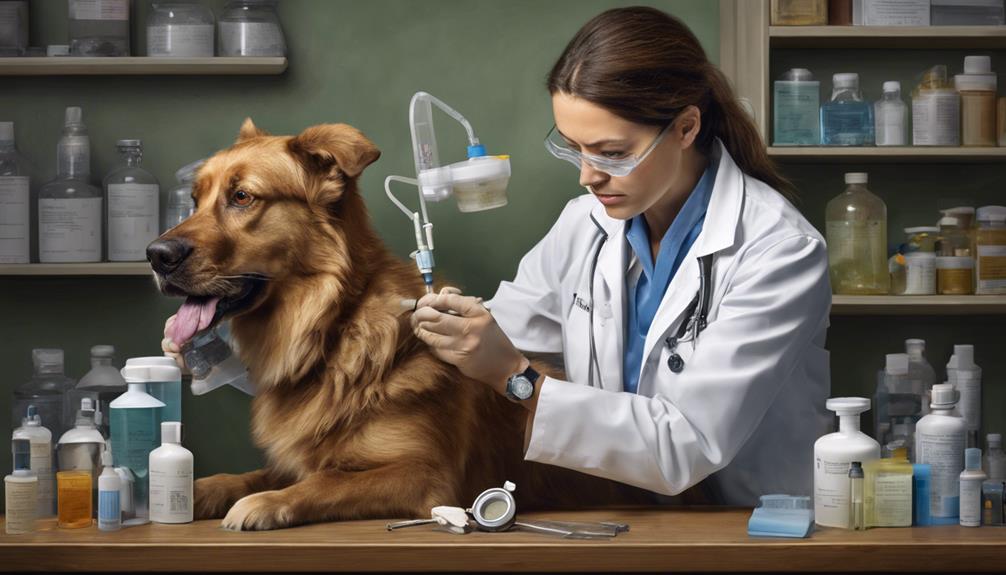Yes, morning glories can be toxic to dogs. They contain harmful substances that can cause stomach issues and other serious symptoms. If your dog shows signs of eating morning glories, immediately seek help from a vet. Symptoms include vomiting, diarrhea, and weakness. Treatment involves decontamination and providing a supportive environment. Prevent poisoning by keeping morning glory plants out of reach and learning about toxic plants. Recognizing poisoning early is crucial for your pet’s well-being. Understanding the risks can help you keep your furry friend safe. More information on prevention and treatment is available.
Key Takeaways
- Some morning glory species contain toxic substances harmful to dogs.
- Ingesting morning glory can lead to mild gastrointestinal issues in dogs.
- Immediate veterinary care is crucial if morning glory ingestion is suspected.
- Symptoms of morning glory poisoning include vomiting, diarrhea, and incoordination.
- Prevent dogs from accessing morning glory plants to avoid poisoning risks.
Morning Glory Toxicity in Dogs
When it comes to morning glory toxicity in dogs, pet owners must understand the risks associated with certain species of morning glories that can be harmful to their pets.
Some species, such as Ipomoea violacea and Ipomoea carnea, contain toxic lysergic alkaloids in their seeds. These seeds are the most critical part of the morning glory plant and can have harmful effects if ingested by dogs. While eating the foliage of morning glory may lead to mild gastrointestinal issues, it's essential to prevent dogs from consuming any part of these toxic plants.
To guarantee the safety of our furry friends, it's vital for pet parents to be aware of which plants are safe around dogs and to avoid species like morning glories that can be toxic. If ingestion of morning glory is suspected, immediate veterinary care is necessary to prevent toxicity and promptly address any symptoms that may arise.
Symptoms of Morning Glory Poisoning

Morning glory poisoning in dogs can cause various symptoms that indicate toxicity. Signs such as vomiting, diarrhea, and potential neurological effects may be observed.
If a dog shows these signs after ingesting morning glory plants, it's essential to seek immediate veterinary care for proper treatment.
Common Signs of Poisoning
Experiencing gastrointestinal issues like vomiting and diarrhea is a common indication of morning glory poisoning in dogs. When dealing with morning glory toxicity, it's important to recognize the signs to guarantee prompt treatment.
Here are some common signs of poisoning in dogs:
- Vomiting and Diarrhea: These are early signs of poisoning and indicate that the dog may have ingested morning glory seeds or foliage.
- Incoordination and Agitation: If your dog appears unsteady on its feet or unusually restless, it could be a symptom of morning glory ingestion.
- Mild Gastrointestinal Effects: Consuming morning glory foliage typically leads to mild stomach upset in dogs.
- Symptom Severity: The severity of symptoms depends on the amount ingested and the specific species of morning glory.
Treatment for Ingestion
After recognizing the common signs of morning glory poisoning in dogs, the next step involves promptly initiating appropriate treatment for ingestion symptoms. Decontamination methods such as inducing emesis may be utilized to remove the toxic substance from the dog's system.
Ensuring to keep the affected dog in a quiet, dimly lit room to minimize external stimuli during treatment is important. Intravenous fluids are often administered to help stabilize the cardiovascular system and maintain hydration levels. Monitoring for symptoms like hyperthermia and tachycardia is critical throughout the treatment process.
In cases where anxiety, tremors, or seizures occur, diazepam can be used to manage these symptoms effectively. Remember, seeking veterinary assistance promptly is crucial in ensuring the best possible outcome for a dog suffering from morning glory poisoning.
Treatment Options for Dogs

Upon exposure to morning glory poisoning, treatment options for dogs typically involve inducing vomiting for decontamination. Following decontamination, additional measures may be necessary to support the affected pet's recovery:
- Provide a Calm Environment: Keep the dog in a quiet, dimly lit room to reduce stimulation and promote a sense of calm, aiding in the recovery process.
- Administer Intravenous Fluids: Stabilize the cardiovascular system by administering fluids intravenously, helping to flush out toxins and maintain hydration.
- Monitor for Symptoms: Keep a close eye on the dog for symptoms such as hyperthermia and tachycardia, as early detection is essential for effective treatment.
- Consider Medication: Diazepam can be used to manage symptoms like anxiety, tremors, and seizures, providing relief and support during the healing process.
Prevention Tips for Pet Owners

Let's make sure to keep morning glory plants out of our pets' reach to prevent any accidental ingestion.
It's essential to know the signs of morning glory toxicity in dogs, so we can act quickly in case of exposure.
Toxicity Signs in Dogs
To prevent morning glory poisoning in dogs, pet owners should proactively keep these plants out of reach and educate themselves on the toxicity signs to watch for. Morning glory toxicity signs in dogs can range from gastrointestinal issues to more severe toxicity symptoms. Here are some tips to help pet owners recognize potential morning glory poisoning in their dogs:
- Monitor your dog for symptoms like vomiting, diarrhea, and lethargy.
- Contact your veterinarian immediately if you suspect your dog has ingested morning glory.
- Keep the contact information for emergency veterinary care easily accessible.
- Learn about other potentially hazardous plants to safeguard your pet's well-being.
Emergency Vet Contact
In case of suspected morning glory ingestion, promptly contact the Animal Poison Control Center at (888) 426-4435 for immediate assistance. Quick action is crucial in such situations to safeguard your pet's well-being. It's important to be mindful of the symptoms of morning glory toxicity and to keep these plants out of your pet's access. If your dog consumes morning glory seeds or foliage, seeking prompt veterinary care is highly recommended for proper treatment. Below is a table highlighting the importance of emergency vet contact in cases of morning glory ingestion:
| Morning Glory Emergency Vet Contact |
|---|
| Contact Animal Poison Control Center: (888) 426-4435 |
| Quick response can prevent toxicity |
| Educate yourself on symptoms and prevention measures |
Veterinary Insights on Morning Glories

Our veterinary experience highlights the importance of recognizing the potential risks morning glories pose to dogs due to their toxic nature. Morning glories contain lysergic alkaloids in their seeds, making them harmful if ingested by dogs. Symptoms of morning glory poisoning in dogs can range from mild gastrointestinal effects like vomiting and diarrhea to more severe signs such as incoordination and agitation.
To address these risks effectively, it's vital for dog owners to be aware of the following insights:
- Toxicity: Morning glories can be toxic to dogs due to the presence of lysergic alkaloids in their seeds.
- Symptoms: Ingesting morning glory seeds can lead to symptoms like incoordination and agitation in dogs.
- Gastrointestinal Effects: Consumption of morning glory foliage usually results in mild gastrointestinal effects such as vomiting and diarrhea in dogs.
- Severity Factors: The severity of toxicity in dogs from morning glories depends on factors like the amount ingested and the size of the dog.
Understanding these insights can help pet owners take necessary measures to ensure their dog's safety around morning glories.
Other Toxic Plants for Dogs

Investigating additional hazardous plants for dogs, we explore the toxic nature of oleander, daffodils, hydrangea, yucca, and sweet peas. These plants can be harmful to our furry friends if ingested, causing various symptoms ranging from mild discomfort to severe illness. To help you keep your canine companions safe, here is a table highlighting the dangers of these toxic plants:
| Plant | Toxic Part |
|---|---|
| Oleander | All parts |
| Daffodils | Bulb |
| Hydrangea | Leaves and flowers |
| Yucca | All parts |
| Sweet Peas | Seeds and pods |
It's essential to be aware of these toxic plants and make sure they are not accessible to your dogs. Remember, prevention is key when it comes to keeping your pets safe from glory poisoning and other plant-related hazards. If you suspect your dog has ingested any of these toxic plants, contact your veterinarian immediately for guidance and assistance.
Recognizing Morning Glory Poisoning

Recognizing the symptoms of morning glory poisoning in dogs can help pet owners act swiftly to seek veterinary care and prevent further complications. If you suspect your dog has ingested morning glory seeds, watch for the following signs:
- Gastrointestinal Distress: Keep an eye out for symptoms like vomiting and diarrhea, which are common indicators of morning glory poisoning in dogs.
- Lethargy and Weakness: If your dog appears unusually tired or weak, it could be a sign of toxicity from morning glory ingestion.
- Changes in Behavior: Look for any unusual behavior changes in your dog, such as disorientation or confusion, which may signal poisoning.
- Difficulty Breathing: In severe cases of morning glory poisoning, dogs may experience difficulty breathing, which requires immediate veterinary attention.
Being aware of these symptoms and taking prompt action by seeking veterinary care can make a significant difference in your dog's recovery from morning glory poisoning. Remember, early intervention is key to ensuring the best possible outcome for your furry friend.
Safety Measures for Pet Owners

To heighten the safety of your pets, make sure morning glory plants are kept out of their reach to prevent potential ingestion and poisoning risks. Morning glories can be toxic to dogs, especially certain species like Ipomoea violacea and Ipomoea carnea. The seeds of these plants contain lysergic alkaloids, which can lead to toxicity if ingested by pets.
As responsible pet owners, it's essential to be mindful of the plants in your surroundings and guarantee they aren't accessible to your furry friends. If you suspect that your pet has ingested morning glory seeds or is showing signs of poisoning, immediate veterinary attention is necessary.
Educate yourself on the symptoms of morning glory toxicity in dogs so you can quickly recognize any issues and seek appropriate treatment. By taking these safety measures and staying informed, you can help protect your beloved pet from the potential dangers of morning glory plants.
Frequently Asked Questions
What Happens if My Dog Eats Morning Glories?
If your dog eats morning glories, it can lead to gastrointestinal issues like vomiting and diarrhea. The seeds are the most critical part due to harmful lysergic alkaloids.
Symptoms may include incoordination and agitation. Immediate veterinary care is essential to prevent severe toxicity.
Monitoring the dog's condition, inducing vomiting if necessary, and providing supportive care are common treatments for morning glory poisoning in dogs.
How Poisonous Are Morning Glories?
Morning glories can be toxic to dogs due to lysergic alkaloids in their seeds. Immediate veterinary care is essential if ingestion occurs. Symptoms may include gastrointestinal issues and toxicity.
Species like Ipomoea violacea and Ipomoea carnea are most harmful. These alkaloids can cause serious health problems. Prevention and awareness are key to keeping dogs safe from morning glory toxicity.
Are Moonflowers Poisonous to Dogs?
Moonflowers, like morning glories, can be harmful to dogs. They contain toxic lysergic alkaloids that can lead to gastrointestinal issues and toxicity if ingested. It's important to keep moonflowers out of reach of pets to prevent potential poisoning incidents.
These plants have large, fragrant white flowers that bloom at night, attracting dogs with their enticing scent. It's important to be cautious and keep pets safe from these toxic plants.
Are Morning Glory Poisonous to Birds?
Morning glory seeds can be toxic to birds, causing symptoms like incoordination and agitation due to lysergic alkaloids. The severity of poisoning varies based on the species and amount ingested. If a bird shows signs of poisoning from morning glory seeds, immediate veterinary care is vital.
Just like birds, dogs should avoid ingesting morning glories as they can also be harmful. Ensuring pets are kept away from potentially toxic plants is important for their safety.
Can Dogs also be Poisoned by Morning Glories?
It’s important to be cautious with azaleas and dogs poisoning risk, but morning glories can also be harmful to dogs if ingested. The seeds and roots contain toxic substances that can cause vomiting, diarrhea, and even hallucinations in dogs. It’s best to keep these plants out of reach of pets.
Conclusion
To sum up, it's vital to remember that morning glories can be harmful to our furry friends.
Just like the saying goes, 'prevention is better than cure,' so it's important to keep these toxic plants out of reach of our dogs.
By being watchful and knowledgeable about potential dangers in our homes and gardens, we can guarantee the safety and well-being of our beloved pets.








